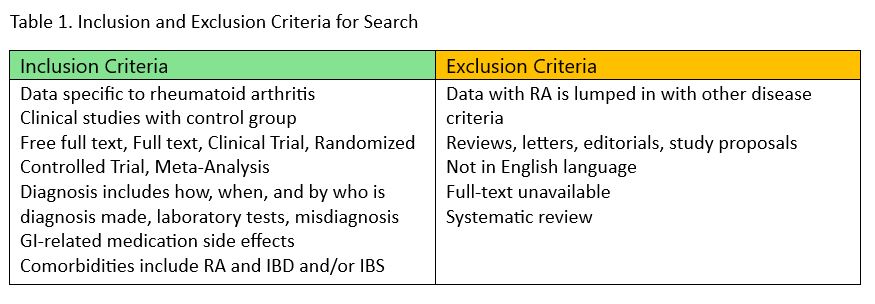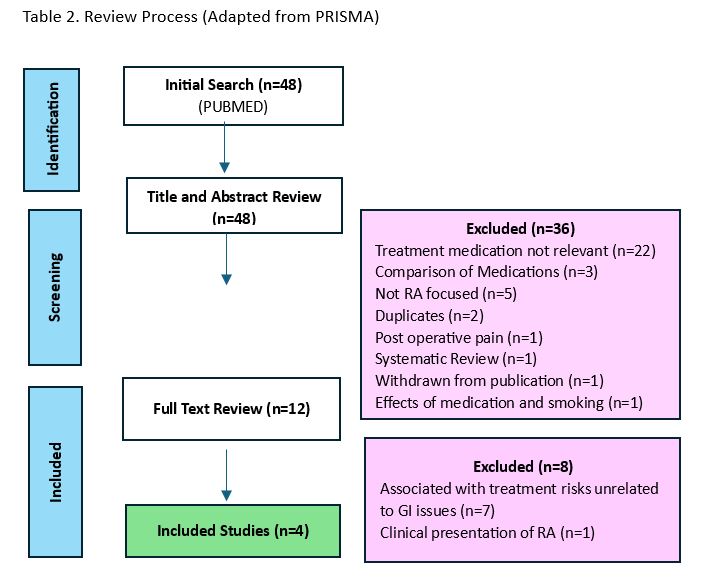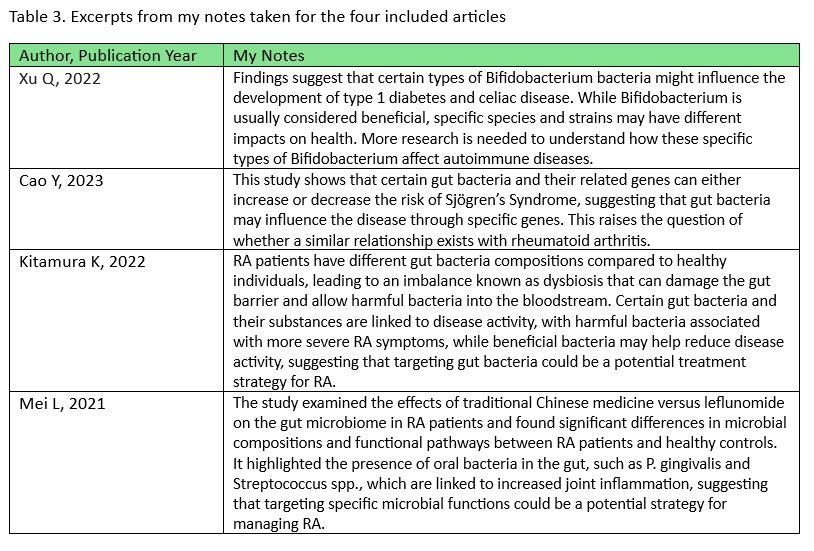Session Information
Date: Saturday, November 16, 2024
Title: Patient Perspectives Poster
Session Type: Poster Session A
Session Time: 10:30AM-12:30AM
Background/Purpose: Twelve years ago, I was diagnosed with rheumatoid arthritis (RA). Initially, I was hopeful that the first biologic DMARD would slow the disease and relieve my symptoms. After trying eight different biologics and biosimilars, I found a regimen that effectively manages my RA symptoms. When gastrointestinal issues began, I set out to find answers. While contributing to a literature review on polymyalgia rheumatica through my career, I learned to evaluate clinical studies using Preferred Reporting Items for Systematic Reviews and Meta-Analysis (PRISMA). This experience highlighted the importance of structured, high-quality research, leading me to reconsider my approach to researching my RA symptoms and comorbidities. Seeking high-quality literature is at the heart of reviewing, so I began to reflect on my own process for researching my condition. I wondered why I had sometimes used a common search engine to read the first articles that popped up in my search results instead of using a quality control process.
Intervention: While investigating new symptoms, I planned a strategic search through the PubMed database, implementing ideas gleaned from my literature review experience.
First, I decided to focus on these questions for my search:
- What research supports or opposes a connection between RA and GI symptoms? (Comorbidities, GI Link)
- What is causing the abdominal pain and gut problems affecting my quality of life? (Triggers, Quality of Life)
- How can I change my lifestyle to have fewer GI symptoms? (Diet, Treatment)
Second, I specified the inclusion and exclusion criteria (Table 1), and then I selected the search filters. The filters applied in the PubMed advanced search included articles between 2010-2024 categorized as free full text, full text, clinical trial, meta-analysis, and randomized control trial with the terms “rheumatoid arthritis” AND “gastrointestinal.” With my search complete, I screened articles for relevance and quality level. I sorted the included articles by topic and began reading.
Maintenance: My search yielded 48 results, which were exported onto a spreadsheet. During the initial screening process, I used the inclusion/exclusion criteria to exclude 36 of the 48 articles. Each of the 12 articles meeting inclusion criteria was assigned a topic it most closely aligned with, and then the articles were sorted. Articles were categorized as follows: Treatment (n=7), Gut Biome and RA (n=4), and Clinical Presentation (n=1). (Table 2) I read the full text of the four articles related to the gut biome and RA and took notes to facilitate my conversations with my primary care physician, GI specialist, and rheumatologist. (Table 3)
Quality of Life: Learning about RA’s relationship to the gut gave me new information to digest. I consulted a gastroenterologist about gut microbiota and RA. I shared my learnings and together we made a plan to assess which foods I tolerate well. I’m on a low FODMAP diet to calm my digestive system before reintroducing foods. My rheumatologist and I concluded my RA is well-managed and my digestive issues are likely unrelated to medication. Using systematic searches can help patients find key studies, enhancing their understanding and empowering better healthcare decisions and discussions with providers.
To cite this abstract in AMA style:
Fritz S. How Completing a Systematic Literature Review Improved How I Research My Own Rheumatoid Arthritis and Comorbidities [abstract]. Arthritis Rheumatol. 2024; 76 (suppl 9). https://acrabstracts.org/abstract/how-completing-a-systematic-literature-review-improved-how-i-research-my-own-rheumatoid-arthritis-and-comorbidities/. Accessed .« Back to ACR Convergence 2024
ACR Meeting Abstracts - https://acrabstracts.org/abstract/how-completing-a-systematic-literature-review-improved-how-i-research-my-own-rheumatoid-arthritis-and-comorbidities/



